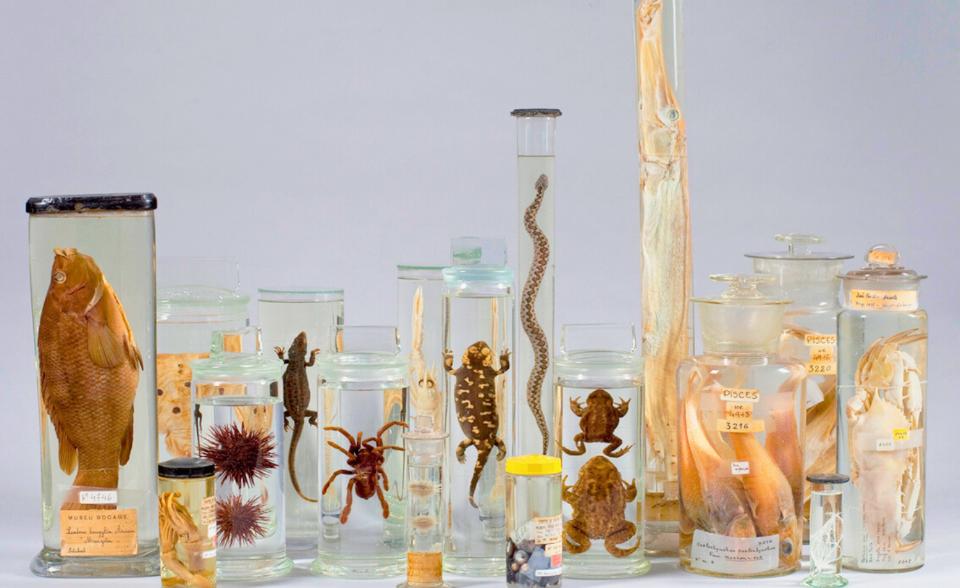-
Date:
From 15 Jun 2026 until 19 Jun 2026
-
Deadline for Applications:
15 May 2026
-
Location:
Museu Nacional de História Natural e da Ciência (MUHNAC)
-
Duration:
36 hours (contact hours)
-
Schedule:
09h00-12h30 and 14h00-18h00
-
Lecturer or Responsible:
Ricardo Jorge Lopes (CE3C-BEC, CIÊNCIAS), Judite Alves (CE3C-NHC&S, MUHNAC), Pedro Andrade (MUHNAC) & Ana Campos (MUHNAC)
-
Department Responsible:
Departamento de Biologia Animal, Faculdade de Ciências da Universidade de Lisboa
-
Nº (min - max) Students:
10-15

Objectives
This course aims to provide an updated vision of the potential of museum collections for biodiversity research. More specifically aims to:
- Present case studies on the value of museums and the use of collections and specimens in the 21st century, using new technologies and analytical methods. These include, among others:
a) discuss ‘whole specimen’ techniques;
b) consider how museum specimens provide genetic and genomic resources;
c) present non-genetic molecular methods (e.g., stable isotopes, toxicology and quantification of color);
d) understand the potential of the spatial and temporal data gathered along with the specimen, especially when made available in global repositories. - Present the ways that ‘voucher specimens’ of vertebrates are prepared.
Participants must be present at 85% of the contact hours (meaning they can miss one half-day) and actively participate in all activities.
This course may have a correspondence in terms of credits toward PhD programmes at CIÊNCIAS or programmes jointly offered by CIÊNCIAS and partner institutions, with 6–7 hours of contact time per ECT, depending on specific requirements. For these students, in addition to the exercises completed during the week, submission of a written report two weeks after the course is mandatory. For programmes with fewer contact hours per ECT (6h/ECT), students must complete an additional assignment (a summary report). If necessary, 1 or 2 extra contact hours may be added. These reports are also recommended for other PhD students seeking recognition of the course by their institutions.
Specific needs (e.g., computers, lab): Taxidermy and general lab facilities.
Minimum requirements: Bachelor in Biological and Natural Sciences or related areas.
Directed to: Students interested in the preservation and use of biological specimens.
General plan
Monday
09h00 - Value of museums in the 21st century
- the use of Biological collections
- the principle of the “extended specimen”
- current methods for preparing specimens
10h30 - Invited lectures
- “whole specimen” examples, including CT scanning and 3D models
14h00 - Practical
- digital vouchers, photogrammetry and 3D printing
Tuesday
09h00 - Museum specimens as a genetic and genomic resources
10h30 - Invited lectures
- examples on the use of genetic data from museum specimens
14h00 - Practical
- preparing voucher specimens (Birds)
Wednesday
09h00 - Museum specimens as a resource for non-genetic molecular analysis
10h30 - Invited lectures
- examples on the use of non-genetic molecular analysis data from museum specimens
14h00 - Practical
- preparing voucher specimens (Mammals)
Thursday
09h00 - Museum specimen’s data as a resource for biodiversity analysis
10h30 - Invited lectures
- examples on the use of museum data for biodiversity analysis
14h00 - Practical
- data validation for public repositories and data retrieval
Friday
09h00 - Practical
- preparing voucher specimens (Fluid preservation)
14h00 - Visit
- MUHNAC collections - types of specimens and storage
Fees
Free for 1st year PhD students in Doctoral programmes at CIÊNCIAS (e.g. Biology), Biodiversity, Genetics and Evolution (BIODIV ULisboa; UPorto), Biology and Ecology of Global Changes (BEAG ULisboa, UAveiro) and Sustainability Science (ULisboa, several institutions), when the course counts credits for their formation, in which case the delivery of a final report done after the course is mandatory; the course is also free for more advanced PhD students of the BIODIV programme (ULisboa or UPorto); 50 € for more advanced PhD students of CE3C; 70 € for PhD students of the PEERS network (CFE); 125 € for CIÊNCIAS Master students and unemployed; 180 € for BTI, BI and other PhD students; 250 € for professionals and postdocs.
When the maximum number of students is reached, 10 vacancies will be available for non-paying 1st year PhD students mentioned above, being, by order of preference, students from: 1) CE3C; 2) BIODIV (not from CE3C); 3) CIÊNCIAS (not from CE3C); 4) Sustainability Science (not from CE3C or CIÊNCIAS); 5) BEAG (not from CE3C or CIÊNCIAS).
How to Apply
Candidates should complete the APPLICATION FORM
https://inqueritos.ciencias.ulisboa.pt/index.php/421856
This form is strictly confidential, as explained in the introduction, and will be used solely for the application process.
When filling out the form, mind to:
- FILL ALL THE MANDATORY FIELDS;
- UPLOAD CV AND MOTIVATION LETTER, both mandatory; use the names as instructed;
- If you want to resume later, SAVE the form; otherwise, you will need to fill everything out again;
- At the end, SUBMIT the form before exiting.
If you have any questions, please contact the coordinator of the CE3C Advanced Courses, Margarida Matos (mmmatos@fc.ul.pt), and the teacher, Ricardo Jorge Lopes (rjlopes@ciencias.ulisboa.pt).

